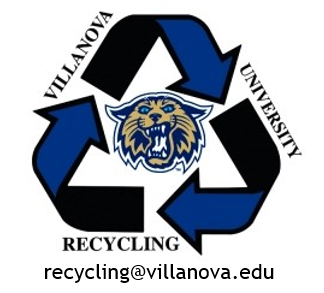Our History
Villanova University Recycling began as a small spark of change and has grown into a robust, campus-wide program fueled by the energy of the Villanova community. When the program launched in 1990, Villanova recycled only white office paper, cardboard, and aluminum cans, achieving a recycling rate of under 10 percent. Today, the University recycles more than double the amount of materials at a rate of more than 54 percent, diverting nearly 10 times more material each year than in the program’s first year.
Several milestones helped shape this growth. Following the passage of Pennsylvania Act 101 in 1990, Villanova invested in expanding its recycling capabilities. In 1995, the University hired its first full-time Recycling Coordinator and introduced a recycling logo to promote awareness. As recycling markets shifted, the position evolved into a Manager of Waste & Recycling in 2019 to guide a more holistic, zero-waste–focused program. In 2022, the Student Zero Waste Coordinator internship was created, giving students meaningful, hands-on experience in sustainability and strengthening Villanova’s diversion efforts.
Villanova is also its own hauler for much of its waste and recycling, operating a fleet of collection vehicles staffed by University employees. This in-house system provides greater control over efficiency, safety, data accuracy, and optimization of waste diversion from landfill or incineration.
As awareness has grown, so too has the recycling program’s momentum. Villanova now recycles a much wider range of materials,. While we continue to seek ways to expand our recycling opportunities, it remains essential to remember that reducing and reusing always come before recycling, so waste reduction and recirculation of resources through reuse are our priorities.
Today, global recycling programs face significant challenges. Shifts in international policy and market values have driven up the cost of recycling, leading some organizations to scale back or suspend services. Combined with the effects of the pandemic, increased consumerism, e-commerce, and single-use products, these pressures make waste reduction and diversion more important than ever. Villanova remains committed to sustainable materials management despite rising costs, but we need your partnership to keep the program strong.
By learning campus recycling procedures, reducing contamination, and working to minimize waste, each Villanovan can help protect both our recycling programs and our shared environment.

As Villanova University Waste & Recycling looks ahead to the future and establishes new goals, we will always recognize our humble beginnings, learn from the successes of the past three and a half decades, and harness the positive energy burning throughout the Villanova community that was initiated by the first small spark of change.
